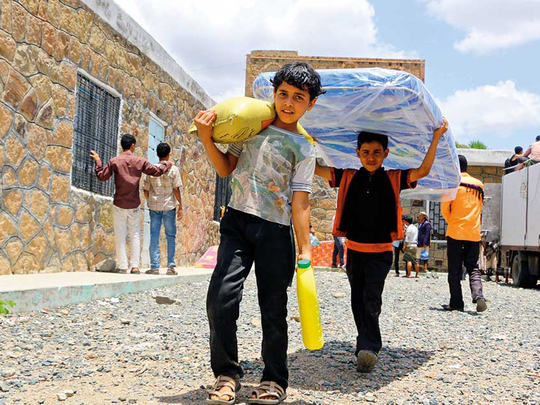
Al Mukalla: At least seven civilians, including a cameraman and two women, were killed when rockets fired by the Iran-backed Al Houthis exploded in residential areas in the southern city of Yemen, Yemen’s third most important city, local government officials said on Monday.
The target of the shelling was a military post where senior security and government officials were attending a military parade and graduation for new security soldiers.
Colonel Abdul Basit Al Bahar, the deputy spokesperson for Taiz’s Supreme Military council, told Gulf News that Yemen’s deputy interior, Major General Ali Nasser Lakhsha’a and other security and government officials survived the attack as some rockets landed at the post’s gate.
“The security officials were about to leave the camp when the rockets began to hit. All of the security officials were unharmed,” Al Bahar said.
Outside the camp, several rockets exploded in densely populated areas in Terbah region, south of Taiz, killing two women, a journalist and several others.
Another cameraman and at least 12 civilians were injured in the same attack.
Al Bahar said that Mohammad Al Qadasi, the journalist, suffered critical injuries and was pronounced dead at the hospital.
His friend Basher Aklan is being treated from injuries, according to Al Bahar. Both journalists rushed to the targeted areas when the rockets began to land at the houses.
Forces loyal to the internationally-recognised president Abd Rabbo Mansour Hadi have been in control of Taiz’s downtown and some outskirts for three years, pushing back Al Houthis’ repeated attempts to recapture their positions.
Hundreds of civilians, including women and children, have been killed in the indiscriminate shelling that also forced thousands of people into leaving their homes to safer places.
Last year, government forces, backed by air support from the Saudi-led coalition liberated the presidential palace, a military post and partially broke Al Houthi’s siege on the city.
On Monday morning, Lakhsha’a, who crossed into Taiz from Aden city, attended graduation ceremony for hundreds of security soldiers who were to be deployed in the liberated areas in Taiz to boost security.
A parade was held where the soldiers displayed their military skills.
Meanwhile, Yemen’s Defence Ministry said on Monday that government troops pushed further into the western province of Hodeida after taking control of Al Mashgar, Al Qawader and other areas, south of Hodeida city.
Dozens of Al Houthis were killed or injured during the fighting, the ministry said.
The Saudi-led Arab coalition entered the Yemeni war in 2015 just months after an Al Houthi coup forced internationally-recognised Yemeni president Abd Rabbo Mansour Hadi out of power.
He later was able to escape house arrest and flee to Aden where he temporarily shifted government headquarters.
Since then, the coalition has gained back 86 per cent of Yemeni territory but major population centres still remain under Al Houthi control.
Saudi Arabia and the US have accused Iran of illegally smuggling weapons into Yemen to sustain Al Houthi war efforts.
One such Iranian-made ballistic missile was fired towards Riyadh last month.
Although it was intercepted, Riyadh called it an ‘act of war’.
The war has cost the lives of thousands of Yemenis and pushed the Arab world’s poorest country to the brink of famine.
The latest government push seeks to take advantage of cracks in the awkward Al Houthi alliance with former Yemeni President Ali Abdullah Saleh’s supporters.
Saleh ruled Yemen for more than three decades until he was forced to resign following an Arab Spring uprising in 2011.
He remained in the country, however, and continued to wield power from behind the scenes.
In 2014, his forces allied with Al Houthi militia, despite the fact that as president he had gone to war with them.
There had been simmering tensions between the two awkward allies in past months that boiled over in December when Saleh suggested he would cooperate with Hadi — he was assassinated shortly after.
Since then senior members of Saleh’s party have either been executed or placed under house arrest by Al Houthis amid a draconion crackdown.
While most analysts say that Saleh’s slaying could give Al Houthis the upper hand in the short term, the broken alliance between Al Houthis and forces loyal to Saleh appears to be permanent, which will help the Yemeni government and its backers in the Saudi-led coalition weaken their grip on the country given the reduction in manpower.












